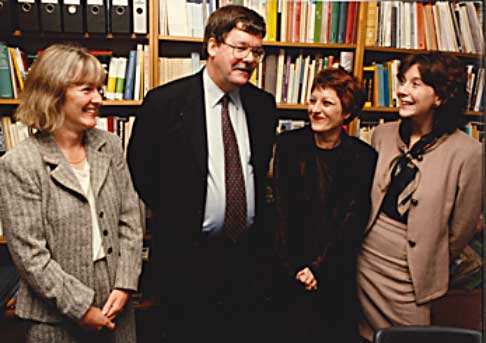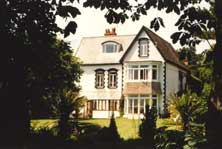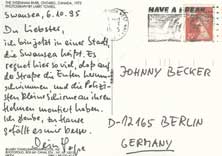“Poets by the Sea: German Writers Visit Swansea” will be part of the Centenary Exhibition “Swansea University: Making Waves since 1920”. The presentation is designed as a tribute to the former Centre for Contemporary German Literature (CCGL), first and foremost, to their renowned Writers in Residence Programme. This preview introduces the four main panels, offering some bonus material – items from the archive, samples of literary and academic work – related to the upcoming display in the National Waterfront Museum, now scheduled for a later date in 2020 and/or early 2021.
At the Centre: series “Contemporary German Writers”, 14 volumes, editor: Rhys W. Williams, exclusive content, e.g. unpublished texts, interview & critical essays
“Was für eine Zukunft siehst Du für die Schweiz? Europa? die Welt?
Die Schweiz hat vorläufig keine. Hoffentlich keine, denn die Schweiz hat in den letzten 120 Jahren immer wieder von den ausländischen, von den europäischen Katastrophen gelebt. […] Wenn Europa scheitert, dann haben wir auf die richtige Nummer gesetzt, kein anständiger Mensch kann hoffen, daβ Europa scheitert.“ (p. 35)
[Peter Bichsel interviewed by Rolf Jucker, February 1995, in: Rolf Jucker (ed.): Peter Bichsel. University of Wales Press 1996 (= Contemporary German Writers), pp. 24-35]
“What kind of a future do you imagine for Switzerland? Europe? The world?
For the time being Switzerland doesn’t have a future. Hopefully it doesn’t, because over the last 20 years Switzerland has repeatedly thrived on the foreign, European catastrophes. […] If Europe collapses, then we’ve bet on the right horse. No decent person can hope for Europe to collapse.”

Dr Brigid Haines, Professor Rhys W. Williams: CCGL-Director,
Herta Müller: Nobel-laureate & Honorary Fellow of Swansea University, Dr Mererid Hopwood
“Man ist in Deutschland so oft versucht, Metaphorik zu sehen, wo es für mich nackte Realien sind. […] Ich befinde mich auch immer vor dem Problem, wie beschreibt man Diktatur? Es wäre ja furchtbar, ein pädagogisches, ideologisches Buch zu schreiben mit umgekehrten Vorzeichen, wie es im Sozialismus selber geschrieben werden sollte. Man kann kein holzig realistisches Buch über eine Diktatur schreiben.“ (pp. 18-19)
[Herta Müller interviewed by Brigid Haines and Margaret Littler, in: Brigid Haines (ed.): Herta Müller. University of Wales Press 1998 (= Contemporary German Writers), pp. 14-24]
“German readers are often tempted to see imagery, where I can recognize bare realities [...]. I keep finding myself faced with the problem of how to describe dictatorship. It would be terrible to write another pedagogical, ideological book only in a reversed framework, as it was supposed to be written under Socialism. One cannot write a book about a dictatorship in such a woody style and strictly realistic manner.”
From the Writer’s Workshop: poetry and prose inspired by Swansea
“Er machte einen Umweg, um mich zum Bahnhof von Swansea zu fahren. Ich bedankte mich und fragte ihn, ob ich ein Foto von ihm machen dürfe. […] Ein Schwarzweißfoto, das einzige Foto, das ich in Wales gemacht habe. Ich habe es mir in der Küche an die Wand gepinnt. Blicke ich beim Frühstücken hoch, sehe ich diesen Mann und im Hintergrund, ein schöner Zufall, rechts oben zwei Möwen im Flug, deutlich vor jenem dunklen Stück Himmel, das der große Wind gerade in dem Augenblick in die Wolkendecke gerissen hatte.” (p. 54)
He took a detour to drive me to Swansea station. I said thank you and asked if I might take a picture of him. […] A black and white photo, the only photo that I took in Wales. I pinned it to the kitchen wall. Looking up from my breakfast, I can always see this man and, in the background towards the top right, the incidental beauty of two seagulls in flight, rendered clearly in front of that dark piece of sky, which the great wind had just ripped through the cloud cover in that very moment.
[Uwe Timm: Nicht morgen, nicht gestern. Erzählungen. Kiepenheuer & Witsch 1999, pp. 29-54] Both volumes on Timm’s œuvre (= CGW) were edited by David Basker.

Complete series: Peter Schneider (1995), Volker Braun (1995), Peter Bichsel (1996), Sarah Kirsch (1997), Jurek Becker (1998) Herta Müller (1998), Uwe Timm (1999), Christoph Hein (2000), Hermann Peter Piwitt (2000), Kerstin Hensel (2002), Zafer Şenocak (2003), Hans-Ulrich Treichel (2004), Esther Dischereit (2007), Uwe Timm II (2009).
Postcards To/From Swansea: unpublished quotes (CCGL archive) from correspondence with the writers; additionally, the exhibition will feature smaller drawings by poet Sarah Kirsch that were incorporated into her letters and faxes
“Caswell House sieht wunderbar aus! Und so nah an dem Strand! […] Wird man da auch arbeiten können? Dichter müssen fortwährend die Möglichkeit haben, auch genügend Tische und Schreibtische. Am liebsten wären sie natürlich allein. Andererseits brauchen sie viel Platz zwischen sich, lieber 2 kleine Wohnungen nebeneinander als eine groβe.“
[Sarah Kirsch to Mererid Hopwood, 15. February 1994, about shared accommodation and period as Poet in Residence along with Christoph W. Aigner]
“Caswell House looks lovely. And so close to the beach! […] Will one be able to work there as well? Poets always need to have the opportunity to write, they also need enough tables and desks. They would ideally of course be alone. Then again, they also need lots of room between them: preferably two small flats next to each other rather than one large one.”

“Es braucht ja immer eine gewisse Zeit, bis ein Schriftsteller mit seinen gelehrten Lesern warm geworden ist und herausgefunden hat, wie er am ergiebigsten mit ihnen kommuniziert. […] Nehmt alles nur in allem: es hat mir sehr gefallen.“
[Peter Schneider, first visiting writer in 1993, in his post-residence letter]
“It always takes a certain amount of time until a writer warms to his academic readers and comes to find out how he should communicate with them most fruitfully. [...] All in all and for good measure: It really was a pleasure.”
“Unvergeβlich die Arbeitsgespräche mit Rhys Williams, Terry Holmes und Rolf Jucker (und mehr Namen wären zu nennen) und die so anrührende Unterrichtung über die walisische Literatur und Lebensweise durch Mererid.“
[Volker Braun, thanking the CCGL team after his residence in spring 1994]
“The working discussions with Rhys Williams, Terry Holmes and Rolf Jucker (amongst others who deserve to be named) and all that moving information about Welsh literature and lifestyle from Mererid will remain with me.”

Jurek Becker, sending a postcard to his son, published in: Lieber Johnny: Jurek Beckers Postkarten an seinen Sohn Jonathan, p. 142. ©2004 Ullstein Buchverlage GmbH, Berlin
Legacy
“Die Germanistik in Swansea ist überhaupt ein Beispiel, wie man einen universitären Betrieb nicht als stumpfe Schule führt, sondern durch kritisches Aufgeschlossensein und Lebendigkeit das Interesse an der deutschen Sprache und Dichtung mehren kann. Ein-, zweimal im Jahr werden Dichter aus dem deutschsprachigen Raum von der Universität Swansea zu Lesungen, Diskussionen, zu Leben und Schreiben eingeladen. […] Dichtung hat in Wales einen Stellenwert, der eigentlich in jeder lebendigen Kultur normal sein müβte.“
[Christoph W. Aigner: Swansea/Abertawe, in: Literatur und Kritik 29 (1994), issue 285/286, pp. 5-7]
“German Studies at Swansea is an example of how a university department can be run not as a lacklustre school, but instead it can further interest in German language and literature through its critical open-mindedness and vibrancy. Once or twice a year, writers from German-speaking countries are invited to Swansea University to take part in lectures, discussions, to live and to write. […] In Wales poetry has a significance, which it really ought to possess in every living culture.”
